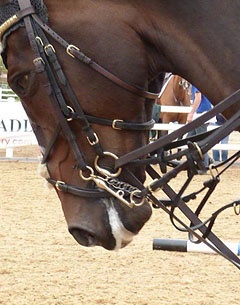
The Helsinki Society for Animal Protection (HESY ry) along with certain horse industry professionals are concerned about the violence and coercion used in equestrian competitions and in the every day training and handling of horses.
Extreme examples of this conduct in equestrian sports include forcing the horse using auxiliary reins, hitting with a whip and kicking with spurs as well as prolonged stress caused by ignoring the horses’ species-specific needs (see Appendix 1).
The rules of the Equestrian Federation of Finland (SRL) state that a horse should not be forced into obedience and that a horse should not be deliberately subjected to pain. In the discipline-specific rules, however, these injunctions are taken back. In show jumping, for example, the rules state that a horse should never be hit more than three times in a row and that excessive use of the whip is considered to have occurred when a horse’s skin has been broken.
Rules like this are in blatant violation of Finland’s Animal Welfare Act (12§), which prohibits the violent handling of any animal as well as kicking and hitting with any damaging instrument.
"If the limit of excessive hitting is not reached until the horse is bleeding, it has been taken too far. This type of misconduct and the permissive atmosphere allowing such violence should be weeded out from equestrian sports. We need to bring the true spirit of the rules to the forefront and forbid riders from causing pain to horses. A horse should not be treated like a piece of sport equipment. It is a sentient, feeling being," states Hannele Luukkainen, the chairman of HESY.
Cases of horses being manhandled are seen at higher levels of the sport as well. Recent examples occurred at the London Olympics and at last year’s Helsinki International Horse Show. Judges and stewards, in particular, have been under scrutiny and have been criticized for not interfering with excessive spurring and rollkur. Rollkur is a training method in which the horse’s neck and head are forced into an extremely low position. In rollkur, the horse cannot see where it is going and, in the worst cases, is unable to swallow or breathe properly.
"It is shocking that the competition jury can be exposed to such clear rule violations without interrupting or disqualifying the competitor’s performance. When such abuse happens in international competitions, which are widely covered by news organizations, one can only imagine what happens outside the competition ring. We must remember that the top riders are representing their disciplines and are often idolized by many young riders," states Katariina Kaartinen Alongi, who has followed the international equestrian scene closely as a coach, judge and competitor of vaulting.
The horse industry needs an attitude change. The clean up of equestrian sports should already start at the riding school level. Riding schools need to discard their old teaching models, in which violence towards horses is accepted. The fact that a horse misbehaves cannot be used to justify inflicting pain with a whip or tightening the nose band to keep its mouth closed. Misbehavior on the horse’s part is usually caused by fear, pain or the fact that the horse does not understand what is being asked of it.
For the same reason, all training programs for judges, stewards and teachers should include ethology, the science of animal behavior. In addition, scoring practices in equestrian events should be changed, and harsh training methods should be abandoned.
"Riding would change significantly if rule violations were tightly sanctioned and if, instead of solely scoring the horse in a competition, the rider would also receive scores based on how he can bring out the best in the horse. Knowledge of ethology would help judges recognize when the riders are pushing the horses too far and make it easier to interfere in such cases. In general, the horse industry could benefit from a shift in training methods: from those based on discipline and punishment towards a more positive approach. A horse would be viewed more as a partner rather than as a piece of equipment, which in turn would bring equestrian sports to reflect the general attitude of the twenty-first century," says horse trainer Minna Lindström.
Appendix 1. Violations seen in equestrian sports:
- Use of the whip and spurs for other than signaling, for example forcing or punishing.
- Excessive tightening of the noseband to prevent the horse from opening its mouth.
- Riding with a particularly hard hand as well as using the rollkur-method, in which the horse’s neck and head are forced into an extremely low position, disabling the horse from seeing where it’s going and, in the worst cases, from swallowing or breathing properly.
- The isolation and lack of exercise of a riding horse. Horses can be standing in their stalls many hours at a time. Sport and leisure horses can remain stabled for up to twenty hours a day, even though a horse in the wild moves sixteen to eighteen hours a day, i.e. all the time.
- Compared to the horse’s size, a stall is very small and non-stimulating, which causes the horse stress.
- For fear of injury, competition horses are not allowed to graze with their con-specifics, and, for this reason, they are not accustomed to the herd life specific to their species.
* Horse paddocks are too small, and horses often spend time in them without the company of another horse. - Rule violations are overlooked at competitions, and the violators are setting a bad example for other equestrians as well as the general public who are interested in equestrian sports.
More information:
Helsingin eläinsuojeluyhdistys HESY ry (Helsinki Humane Society)
Hannele Luukkainen, chairman p. +358 40 547 7770,
hannele.luukkainen@clarinet.fi
Erja Veivo, press secretary p. +358 40 577 4733,
erja.veivo@hesy.fi
Minna Lindström p. +358 50 534 4640,
minna.lindstrom@tunnehevonen.fi
Katariina Alongi p. 1 831 212 2691
(Alongi lives in California and is best reached between 8am and 8pm PST)
katariina.alongi@luukku.com